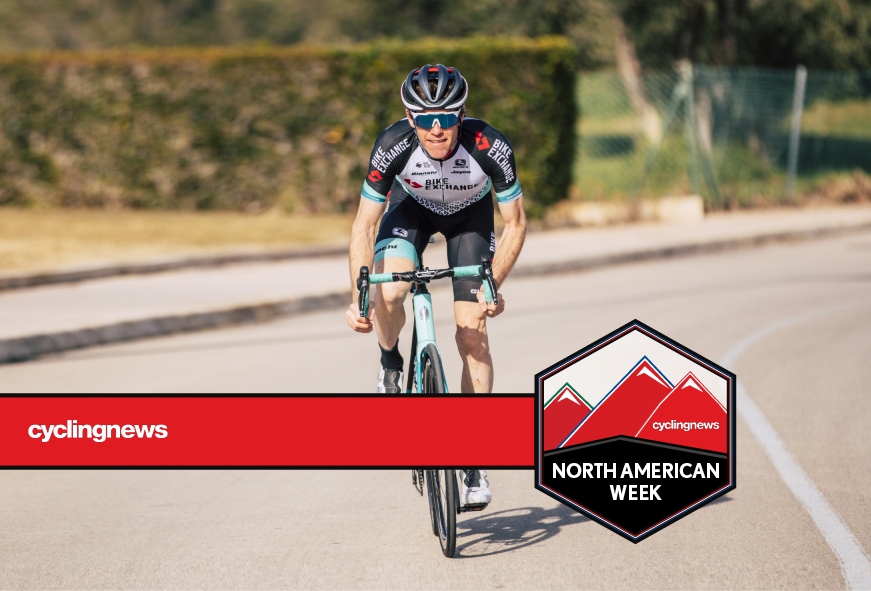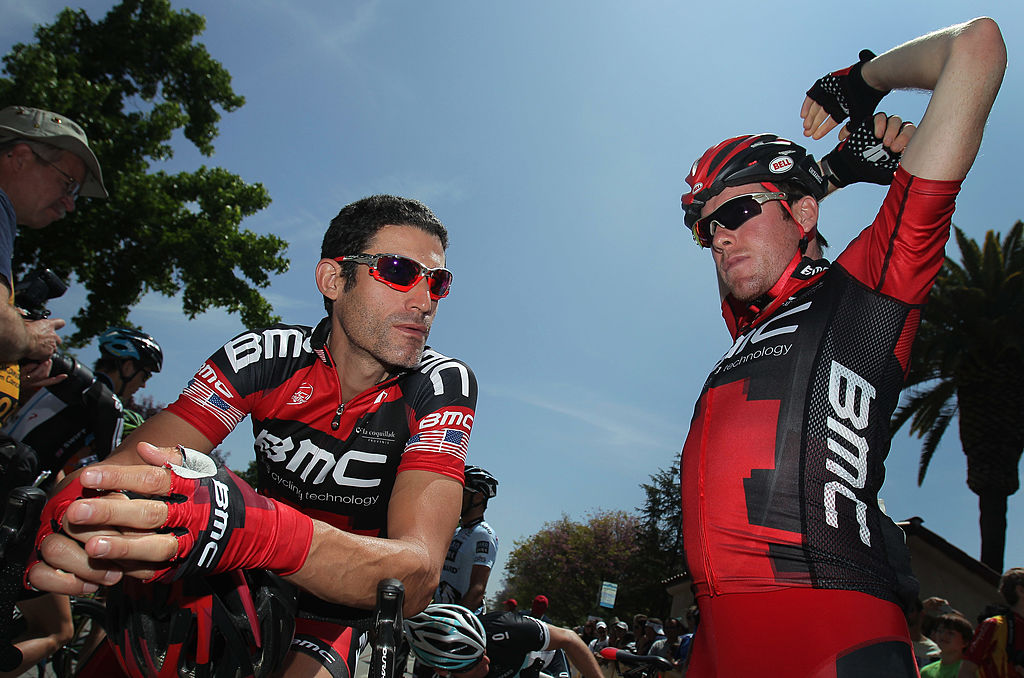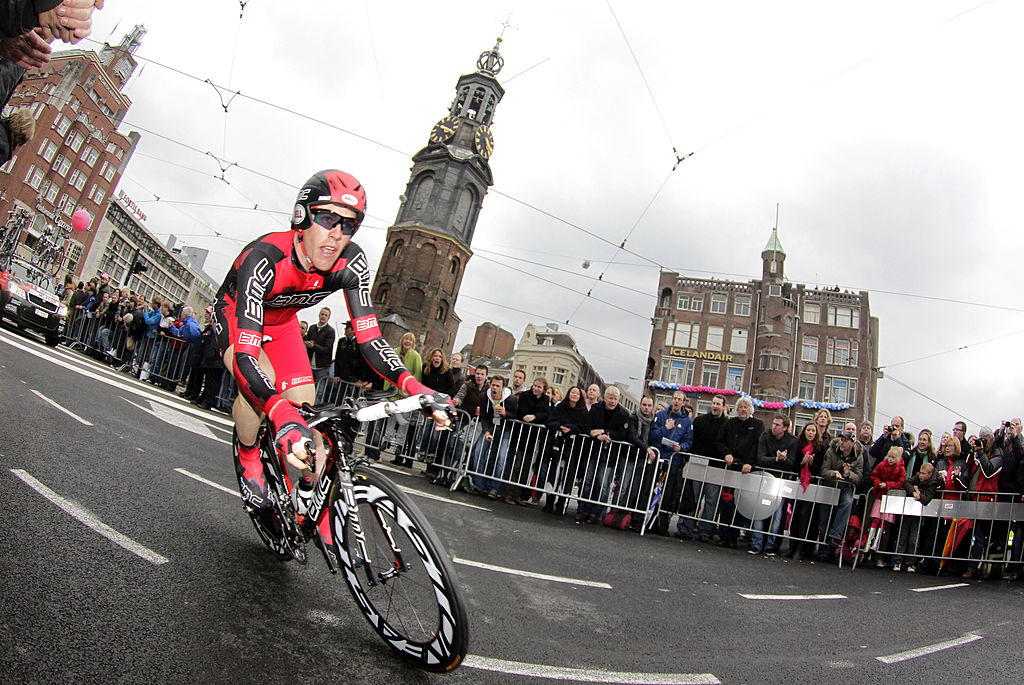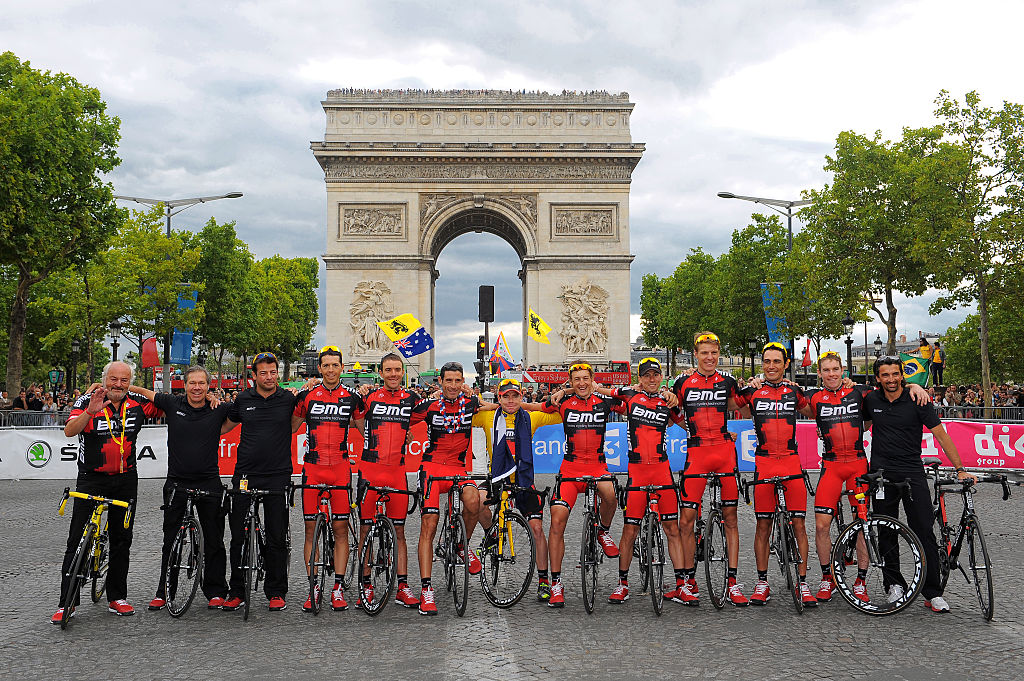Brent Bookwalter: The five races that changed my career
Team BikeExchange veteran looks back over his 13 years in the sport

American Brent Bookwalter is embarking on his 14th year as a professional cyclist in 2021, racing his third year at Team BikeExchange after an 11-year stint with BMC Racing.
The 36-year-old, who announced himself with a second-place finish at the opening time trial of the 2010 Giro d'Italia, has 11 Grand Tour participations to his name and three race wins on his palmarès.
Here, Bookwalter takes us back to the beginning and through to the present day, to tell the story of his career through the five races that have meant the most to him.
Tour of Utah
When Cyclingnews asked me to pick my five races, I took the time to read Laurens ten Dam’s amazing selection from 2018. What stood out from his piece was that some of his choices were general races and not specific years. No one race is ever the same and each edition, like the version of yourself that arrives on the start line, is always different, so like Laurens, I have a few of those blended into my list. Others are more specific, where I can pinpoint the race, the year, and even the moment, but my first two choices are going to focus on the US races, and I'm kicking things off with the Larry H. Miller Tour of Utah.
I’m from the States, and as an American who was desperate to try and break into Europe, the home-based races were huge for my development as a person and as a rider. The Tour of Utah is a race I’ve done so many times in my career. I’ve experienced almost everything a rider possible can at that race but let's wind things back to 2007 and the very beginning.
I had a career-threatening injury that year [2007] when I suffered a compound tibia fracture. I came back a year later and slowly began to find my old level but until that point – in around mid-2008 – there had been some real doubts as to whether I could come back but we won the overall with Jeff Louder and I grew in confidence. That comeback was tough though. I had two surgeries, didn’t walk for six months, my leg wasted away and I really had to build back from scratch.
Utah was a race where I learned how to become an effective teammate, and then during the next years, I learned how to win in that race. I always felt that Utah provided an inspiring backdrop throughout my career and it really cemented my place with BMC Racing because they took a massive gamble on my comeback and there was genuine trust after what I'd been through with my injury.
Get The Leadout Newsletter
The latest race content, interviews, features, reviews and expert buying guides, direct to your inbox!
Fast forward to 2015 when I was third overall. In that edition, I was sprinting and climbing like a demon and it felt like I was on the podium almost every day. I’d been on an incredible journey between that first edition back in 2008, but by 2015 I was starting to figure out what it was like to be a leader in certain races. I learned how to command, how to rally guys around me, and that for me was as inspiring as winning.
In a more general sense, it’s hard to put into words how important a strong US calendar was for almost an entire generation of riders coming through. The fields were deep but not WorldTour level, so there were chances if you were good enough to step up and break out but a lot of the European infrastructure came over, so there was more prestige and attention.
The scene created meant that we could race with a sense of comfort because we could make the Europeans sweat a little and deal with jet lag like we had to if we went to France or Italy, and during that time there was a real heyday of American races. You could almost build your year around them if you were a domestic rider and I think that helped many riders to make that jump to Europe a little easier.
Tour of California

The Tour of California is on the list for slightly similar reasons. I did the race in 2007, just before my accident, and I was racing for the US national team. We were a ragtag bunch of kids, with John Devine, Caleb Fairly, and an incredibly young Tejay van Garderen on the team.
As you might expect we had just two guys on the team who finished, and I was one of them. But the exposure we got to racing against the WorldTour teams was something that I’d never experienced before. It was jaw-dropping and a little overwhelming but for a young rider like myself I had to turn myself inside out each day just to finish because I knew the relevance that race would have on my future.
That 2007 edition was just a blurred mess of suffering, but I’ll never forget being at the back of the bunch and hanging on for dear life, only to turn around and see Paolo Bettini back at his team car and messing around with his shoes.
He was laughing and joking with the DS in the car, wearing about four different layers of clothing like he was out on a gentle ride with his friends while we were all crying out for the pace to ease. Then all of sudden Bettini presses on the pedals, moves back into the wind, and just sprints back towards the peloton while we were on our knees. That incident stuck with me. It was really sobering because it taught me that I had a lot of work to do.
But that race taught me that my dreams of becoming a bike racer were possible and that no matter how much I suffered during that week I belonged to be there. That race opened my eyes in terms of where I needed to go.
Fast forward to 2016 and 2017, and having the opportunity to lead a team and challenge was something special. I know that I landed short but I finished on the podium one year, and California played an important part in my career as it developed. It was a huge honor to lead a team in that race, and while that took a lot of work, and I feel privileged at the same time.
2010 Giro d'Italia

I want to go more specific now and pick my first Grand Tour. We had a big step up at BMC during the winter of 2009 with Cadel Evans and Alessandro Ballan joining from Lotto and Lampre, respectively. For a young rider like myself, it was great to have that experience around the group and I managed to fight my way into the selection for the Giro, where we had Cadel racing as a legitimate contender.
To get the nod and make the team and then to have such a strong ride in the opening time trial where I finished second to Bradley Wiggins was huge, and from the outside that probably looked like the most important aspect of my experience, but there was a lot of depth and many levels to that race for me on a personal level. I carried that momentum from the TT with me and even though I was groveling by the time the race finished I had some really strong performances throughout the three weeks. I learned so much from that race, in terms of what the mind and body could achieve.
When I entered the race I couldn’t comprehend how anyone could race 21 days consecutively and I didn’t totally believe that I could it. So getting through it and coming out of it with some success was influential.
If I look back I didn’t have a huge appreciation or respect for even the whole selection process for a Grand Tour. That was something that I’ve developed over the years as I’ve grown to understand how difficult it can be, but for some reason, I got off on the right foot at the start of that season and built up some momentum. I got along with Cadel from the get-go and I was showing good form, but then someone got sick ahead of Tirreno-Adriatico and I got drafted to help him.
After Tirreno he was looking for a guy in Europe who didn’t have a family and could basically train with him at the top of a mountain for two weeks ahead of the Giro. My now-wife wasn’t in Europe at the time so I jumped at the chance. I didn’t really feel like I was battling with people for a spot, I was just trying to soak up as much as I could at every possible moment. I was just a little too young and naïve to really understand what it meant to be selected for a Grand Tour squad with a real GC contender, but my career has gone through several different stages and I’ve been involved in the selections for many more Grand Tours, and I’ve seen close at hand how hotly contested the situation can be.
But back to the results, and getting second in the opening time trial just blew me away. I remember thinking that my time in the hot seat was probably going to only last a few minutes, but then I just kept outlasting all these amazing time trialists. For a second I started to believe that I could win but the hot seat was this cold, damp and lonely little tent. It wasn’t the Giro hot seat that we see on TV but this miserable tent in Amsterdam. I was pretty much alone in there and it was so surreal.
I joked with my teammates at the time that our best chance of a result was with me in the TT but I had been doing a lot of work on my time trialing and in the end, I was really proud of that ride. When I look back I think about whether I could have gone two seconds faster but it was honestly amazing. It was a great edition of the Giro to be part of with dirt roads, incredible backdrops, and of course Cadel going for the win. I’m proud to have played a part in all of that.
2011 Tour de France

That race was hugely defining for BMC Racing, the organization that I spent over a decade with. Fast forward from the Giro in 2010, and I starting to appreciate how difficult it was to be selected for Grand Tours. We were all thinking that Cadel could win the Tour, so even getting on the team was super competitive, but to have it all come together over those three weeks was just incredible.
The story of that race, or rather what defined it for me and the rest of the team, was just our determination to take everything one day at a time. We didn’t have the flashiest team, the best climbers, or the biggest superstars but we had committed riders who were also really versatile.
We picked up the slack for each other and to ride into Paris with the yellow jersey, it was unbelievable. As a kid growing up in America, the Tour de France is the one race that the general public is aware of, so when we hit the Champs-Élysées all those memories of watching the Tour growing up, all the sacrifices you make, they all felt worth it. It felt like a career confirmation for me in many ways, too, as if being part of the Tour-winning team elevated me in the eyes of the team and the peloton in general.
Within the race, we felt prepared but we ensured that we kept things as simple as possible. There was no over complication and I think that Cadel had this quiet confidence in all of us. He was very good at keeping us on task and George Hincapie was super influential in that process too. We probably wouldn’t have come together on the road without him but Cadel was a great leader. I had a really bad crash just before the first rest day and it was the sort of fall that really hits you hard.
I thought I was going to have to leave the race because we were out for the supposedly easy rest-day ride and I was so buckled and sore. I was off the back of our group and Cadel dropped back for me and talked to me as a person as well as a teammate. That reaffirmed to me that he had confidence in me and it helped me get through that tough moment when doubts were starting to creep in. That's one of the signs of a true leader - someone who can see beyond his own personal ambitions and create an atmosphere within the team that ensures riders look after each other.
What I also remember from that race was how tenacious and dedicated we were as a team at riding on the front and keeping our position. It was basically a drag race every day, and whether it was a sprint stage or a day in the mountains we were always at the front and asserting ourselves. We’d get into these fights with Mark Cavendish and his team and they’d be constantly telling us to get out of the way and that we weren’t sprinters, but we had the confidence and the clout from George and Cadel that helped to keep us there. At some point, I was seen as a bit of a scapegoat, the young American kid who they had to put up with, but truthfully, they were patting me on the back when we got into the team bus.
It was tense though, and nowadays we see that battle play out all the time between the sprinters and the GC riders. Some teams were up in arms about us being near the front but for us, it was just about ticking all the boxes and getting through. We knew that Cadel wasn’t going to have three guys with him in the mountains, but what we could do was keep him meticulously in position so that he was never caught out.
That’s how you win the Tour. That was the year Wiggins crashed out and broke his collarbone too. He’d come into the race as a major favourite and on the day he crashed it was super tense. I had Cadel on my wheel and we were pushing forward and getting through on the gutter and at a certain point I started to shake my head because it was just so frustrating. I felt like I was beating my head against the wall, but Cadel encouraged me to stay on it and keep going, and then a few minutes later I could hear the tangle of wheels, Wiggins was out, and the race was suddenly more open.
2013 Tour of Qatar

It might not seem natural to go from the Giro to the Tour and then to the Tour of Qatar but my final race selection was influential in my career. I first raced in Qatar in 2009, and in a similar way to California, I’d just scraped through by the skin of my teeth. I was questioning my very existence as a bike racer and just miserable for every second, but I went back and between 2012 and 2013 I reached a bit of a turning point at BMC.
By the end of 2012, I was starting to exhaust the teammate role. I was getting a little older and the management was asking me if I was ever going to get some results for myself. So over the winter I did a lot of work, both physically and mentally. I worked with a psychologist for the first time and really tried to reframe my mind. I trained really hard over the winter, and even had my coach came out to Asheville, North Carolina for a mini-camp.
Then I went to this race that I wasn’t excited to do and I won the first stage, which was shocking to me. It was a good confirmation for me and it gave me proof that I could find success in places where I least expected it. I lean on that experience all the time, even now, because it taught me to keep going in the hard moments.
As for the victory, I went away with Gregory Rast and Martin Elminger. It had been splitting all day but there was some hesitation that gave us the chance to move away. We probably looked like easy prey but we were strong and motivated, and somehow I proved the freshest and the strongest against the two guys who were speaking Swiss-German together and trying to work me over. My German is nonexistent but I’m confident, that as old buddies, Rast had told Elminger that he would try and lead him out because he was cramping, but I still managed to pull out the win. I just had tunnel vision that day and used all those training sprints from the winter training camp to keep my focus.